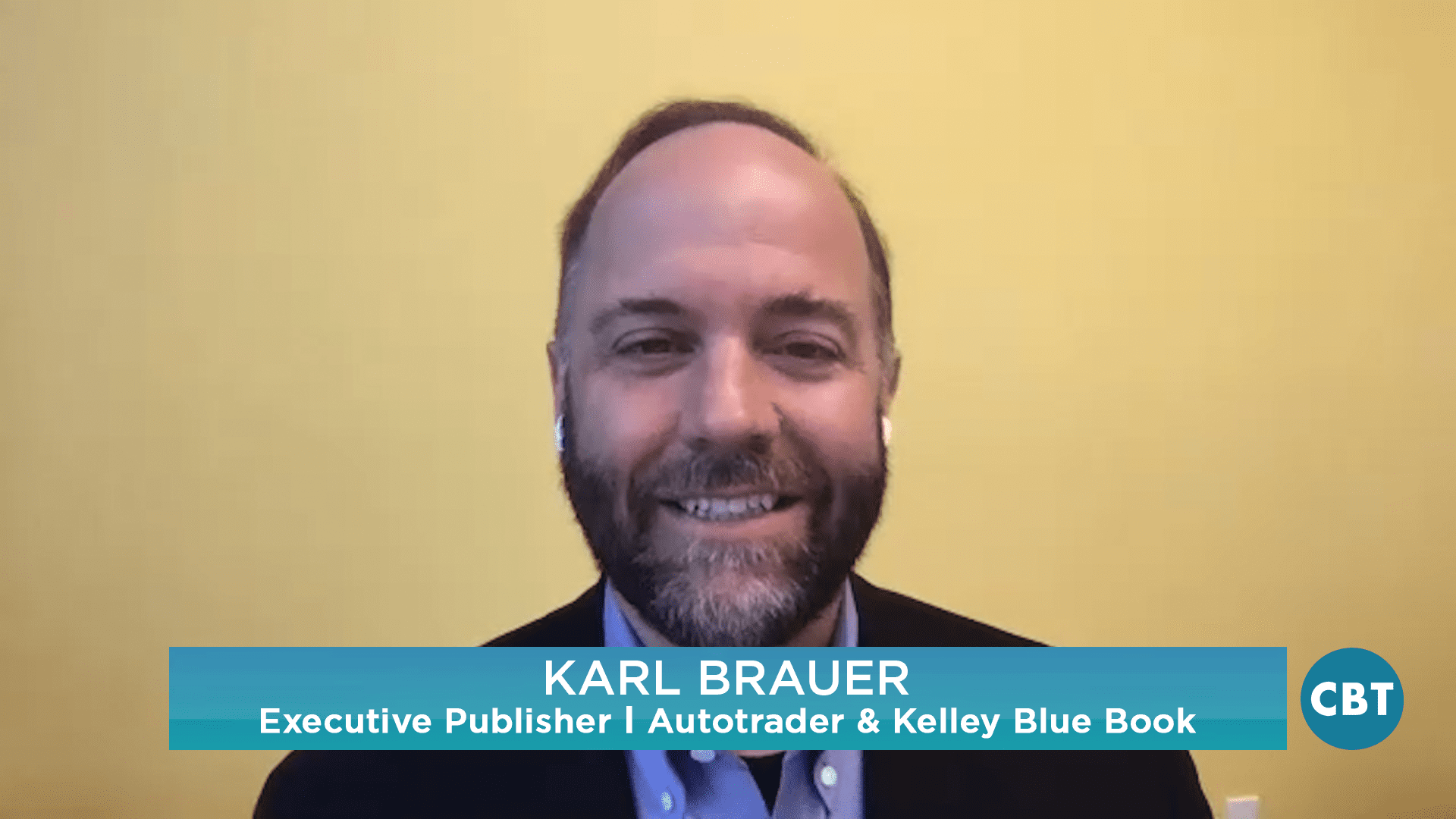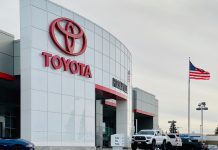From trade agreements, to elections, to the Coronavirus, there has certainly been a lot of news that has shaken the auto industry lately. However, with the help of President’s Day incentives, sales turned out to be different than many experts had predicted. Here to share his insight on these developments, is Karl Brauer, executive publisher for Autotrader and Kelley Blue Book.
 VIDEO TRANSCRIPT:
VIDEO TRANSCRIPT:
Jim Fitzpatrick: Hi everyone. I’m Jim Fitzpatrick with CBT news. Thanks so much for joining us today. Today we’re happy to have with us Mr. Karl Brauer, who’s the executive publisher for Autotrader and Kelley Blue Book. Thanks so much for joining us once again, Karl.
Karl Brauer: Absolutely. Great always to be on with you.
Jim Fitzpatrick: Yeah. As we were just saying before we got started here, it’s that time a month again to talk about the previous month, the numbers, some of the winners, the losers, February’s numbers and also how it affects the SAAR. So let’s jump right in. How’d we do in February?
Karl Brauer: I think we did really well. I mean, remember we’re in a world now where not everyone reports their numbers like they used to, but every brand that reported numbers for February was up, every one of them. And some were up just a little bit, some were up almost 20 percent. Great month for Mazda, but they were all up. And I think the SAAR came in … trying to remember … was it somewhere around closer to 17, I believe, right? Was that where the SAAR came in?
Jim Fitzpatrick: Yeah, yep.
Karl Brauer: So really a good month. And a lot of people are wondering, “How can this keep going? What’s going on here?” I think we’ve got incentives that have still stayed extremely high and I think you have a lot of people who recognize that. I mean, I just heard that Cadillac’s offering up to $20,000 off on the Escalade. They’re trying to get rid of the old ones to get ready for the new one, $20,000. Whenever I hear incentives that high, I always joke, it’s like, “Buy an Escalade, we’ll throw in a Sonic with it,” because it’s enough to-
Jim Fitzpatrick: If you’re buried in your trading, go to a Cadillac dealership because you’ll get handled properly and you’ll get sent home in a new Escalade, right?
Karl Brauer: Right, right, with an extra 20 grand helping you out. So yeah, it was a good month, though. February was a good month. A lot of people, of course are wondering, “Well, what about some of these other things that are going on in the world right now?” A lot of the news obviously around the coronavirus really came in late in the month, so it didn’t have any real hard impact on February. Next month, for the next coming months is going to be where it gets interesting.
Jim Fitzpatrick: Yeah, I would agree. I would agree. What brands jump out that did really well?
Karl Brauer: Well, like I said, I think Mazda was really up. They were up 19 percent.
Jim Fitzpatrick: Wow.
Karl Brauer: I’m looking at some of the numbers. Hyundai was up. I believe they were up … what is that … 16 percent. What’s impressive about their numbers, Jim, is that they were up 60 percent and their fleet was down 20 percent, they’re not even leaning on fleet sales to get those numbers. I mean, we all know that retail is more profitable. So that’s just straight up good news for Hyundai to see those kinds of numbers and all.
Jim Fitzpatrick: Yeah, that’s fantastic. And how about the luxuries?
Karl Brauer: Luxury brands were up, too, Lincoln. I mean, well, Ford report monthly sales, but all of our just kind of metrics that we can observe from outside boards suggested that Lincoln was doing well this past month. Genesis was up this past month. Lexus was up. So again, every brand was up, luxury, non-luxury. And of course we know as SUVs are always what drive a lot of is strong sales. But even Honda had strong car sales. Their car sales were up. The Civic continues to be extremely successful in the market despite not being an SUV, believe it or not.
Jim Fitzpatrick: How does that happen? Do these people not know they should be looking at SUVs?
Karl Brauer: What are they thinking? They’re buying cars. Come on, guys.
Jim Fitzpatrick: Who wants a Civic? That’s crazy. That’s unbelievable. We still are challenged with affordability, right? I mean, that’s still something that every dealer is concerned about. I think we’re $37,000, $38,000, the average price of the vehicle, obviously driven by trucks and SUVs, but where do you think that’s going to rear its ugly head here in 2020?
Karl Brauer: I mean, I think it’s going to, Jim, and it’s a good question because I think what we’re going to see, we’re seeing a preview of coming attractions or detractions, however you want to say it, with full size truck prices, right? Full size truck prices went up 3 percent in 2018, 4 percent in 2019. They are flat so far this year.So we are starting to see that shift where it’s not just this endless up, up, up even for full size trucks, which have been on this tear for basically since the recession ended eight years ago. So finally seeing some kind of pressure come off the pricing of trucks to push them up.
Karl Brauer: And I think that is going to be what we’re going to start to see migrate across the SUV brands and the SUV models, and that’s where this affordability is you’re talking about. Again, I think the only thing that’s countering that right now are the incentives. That’s what’s still pulling people in to the purchase process, even with the high prices that they’re seeing. But it can’t go on forever. And I think we’re going to start to see a price pressure shift finally.
Jim Fitzpatrick: Sure, sure. Used cars are up. They were supposed to be up in 2020 from what the experts say. Have you seen that to be the case thus far?
Karl Brauer: Yeah, we are. We’re seeing used cars really kind of benefit from what we were just talking about, the high prices of new cars. And then I think even more so, again with any of these concerns, with the DOW moving all over the place because of the coronavirus, anything that makes people a little more hesitant to spend money on big purchases, that typically benefits used car sales. And I think we’re going to see that start to play out more and more this year.
Jim Fitzpatrick: Yeah, 3,500 point drop in one week. It’s a little bit … doesn’t really put you right there in the market for a brand new vehicle, does it?
Karl Brauer: It’s a little disturbing. Yeah. Then, of course, it has its strongest gain ever yesterday, right? So it’s just-
Jim Fitzpatrick: It’s all over. It’s crazy.
Karl Brauer: Anything but stability, right? We can’t have that.
Jim Fitzpatrick: Billions of dollars are being made on Wall Street with this huge fluctuation up and down, right?
Karl Brauer: Yeah.
Jim Fitzpatrick: It’s crazy. Yeah. There’s no question. Rivian in Colorado looks like they’re going to have the opportunity to sell directly to consumers, much like the Tesla business model. What say you on that? Do you think that’s going to be a–?
Karl Brauer: Isn’t it crazy, Jim? I mean, we saw Tesla successfully. It took years, but they successfully kind of unwound their obstacle in Michigan. Figure when they can do that in that state, obviously that’s a huge move. And now we’re seeing this play out, like you said, in some of these other newer pure electric brands. And it’s going to be interesting to see how far this goes. Will they keep finding ways around the existing laws, which is essentially what they did in Michigan, or they going to actually start trying to change the laws?
Jim Fitzpatrick: I know.
Karl Brauer: Which there’s never been enough support, political support to do that. But again, the fact that they’re deciding to go through these kind of belabored, convoluted, circumvention efforts to get around the laws, and the courts are letting them do it. So it’s going to be an interesting next couple of years to see how this evolves.
Jim Fitzpatrick: That’s right, especially if something goes to the Supreme Court. As a friend of mine, he’s a dealer, he said you’ll see somebody that will make a big stink over this when Nissan wants to buy back a dealership from a dealer and pay them stupid money for their dealership. And somebody tries to say, “Oh no, no, no, a manufacturer can’t own a dealership and run it and sell cars directly to consumers.” You’ll actually have the dealer that will be going to the defense of the OEM to say, “Oh no, no, if they want to buy my Nissan store for crazy numbers, they’re more than welcome to do that.” And you may find dealers actually fighting for the cause, which would be an interesting twist, right?
Karl Brauer: Yeah. Unimaginable not too long ago, right?
Jim Fitzpatrick: Right.
Karl Brauer: But you’re right. And I think this idea of direct sales, it just seems like it might start to come in and at what level and how it works is still a big question and how long it takes to get there. But I don’t know. I still think the franchise system obviously has a lot of benefits. I think it really works well.
Jim Fitzpatrick: It’s got a lot of runway, anyway.
Karl Brauer: That’s the truth.
Jim Fitzpatrick: Even we all agreed that yes, this is coming, we don’t know when, we don’t know if it’s going to be 10 years or 15 or 20, but I think it’s safe to say in my humble opinion that you will see OEMs, the larger OEMs stick their toe in these waters and say, “Look, let’s buy back our franchises and see if we can sell directly to consumers,” whether it be a smaller Subaru or a Nissan company or what have you, and not put up with dealing with the dealers. There’s always been this love hate relationship between OEMs and dealers anyway, and maybe it does away with that and consumers, they feel may benefit from it because the manufacturer would have more control over the customer experience that everybody is so concerned about, right?
Karl Brauer: Right. And again, as long as they’re there to continue to supply support post-purchase, I think that was always the argument for the franchise dealers. The manufacturer was great at building the cars, but they weren’t so good at handling the post-purchase experience. So if they’re willing to invest and it’s not a small investment, you and I both know, but manufacturer’s willing to invest in humans and places, locations and infrastructure to support the post-purchase experience for their customers, maybe they can give them a try. And what would be interesting, Jim, is if the pendulum swings that way for awhile and after a while the manufacturer’s like, “Nevermind. Okay, well, we want to go back to the–”
Jim Fitzpatrick: Yeah, that’s right. I understand-
Karl Brauer: I can see that happening.
Jim Fitzpatrick: I understand that 50 percent of the Mercedes Benz dealerships in Canada are actually owned by Mercedes Benz.
Karl Brauer: Really?
Jim Fitzpatrick: Yeah. Yep.
Karl Brauer: I did not know that.
Jim Fitzpatrick: Interesting, right? And I’m sure elsewhere in the world, we typically live in this cocoon in the US to say, “This is the way it is throughout the world,” but I understand manufacturers throughout the world and other countries, they are also owners of dealerships and sell directly to consumers in those countries.
Karl Brauer: That’s true.
Jim Fitzpatrick: Not all of them, but many.
Karl Brauer: And remember, the big question, too, during a lot of these Tesla fights that have gone on over the last 10 plus years from the traditional manufacturers was, “Look, we just want fairness. It’s not fair that a Tesla brand can kind of rise itself up out of nothing and all of a sudden be able to sell directly to consumers.” And we’re having to compete with that and be held to the franchise laws. They just wanted fairness. I remember Mary Barra making that exact quote. And that’s a very reasonable perspective and position for them to take. They would just like to be on equal footing. If that one’s going to be true for Tesla, then it should be true for all of them.
Jim Fitzpatrick: I agree. I agree. There’s no question about it. We’ll have to keep an eye on that Rivian situation and see what happens. Trade issues with the EU. That continues to be an issue, or?
Karl Brauer: Yeah. I mean, there’s still trade issues to work out and I feel like the EU, as turbulent as the whole world seems to be right now, whether it’s Brexit, whether it’s tariffs, don’t forget the climate, pollution environmental laws too that are being put in place over there too, so there’s a lot of pressure now on those European brands that are going to sell or any brand that sells in Europe to hit these really rapidly elevating requirements as far as CO2 restrictions. And all of these things, any one of these things would have been a challenge for that marketplace and they’re all happening at the same time. So I think it’s a real challenging time, specifically the European automakers, both in their home countries, but also globally.
Jim Fitzpatrick: Yeah, that’s for sure. Election. Here we are. We’re talking on Super Tuesday. I don’t know that this will air on Super Tuesday, probably in the next few days. However, Super Tuesday will have happened. Does =the election have much of an impact on sales?
Karl Brauer: I’ve talked to all the analysts here at Cox Auto and I can remember my own experiences over the last 20 years in this industry. And what’s weird about elections is you never know what’s going to happen. You sometimes think people are going to pull back from sales because there’s a level of uncertainty which would lead to that. But then you also see elections where you have super high crazy sales. Sometimes I wonder if it’s people who are worried about what’s going to change and they want to get that purchase done before the change happens. It’s like they’re worried about future instability, but they know that right now, today, this year, for instance, up until November 3rd or even until January 20th next year, they know who’s in charge and they know how it’s being run. Whether they like or don’t like the current or future guy, they at least have a sense of stability and they buy while they still have that sense of stability.
Jim Fitzpatrick: That’s right. That’s right. So a lot of different factors out there that could shake the market. Obviously with this current virus out there, the coronavirus, we don’t know what kind of an impact that will have if that worsens or gets worse here in the US. To the president’s point, April may come and do away with the whole problem.
Karl Brauer: Right. Right.
Jim Fitzpatrick: It’s crazy.
Karl Brauer: No, and it is a big question, and everyone’s saying that if it’s a relatively limited impact on the US in terms of the number of people involved, that could really help reduce the impact that it has on the economy and on car sales. But even so, we’re going to have some global impact. Just for instance, I know the Palisade, which is built in Korea, the Hyundai Palisade, great vehicle, super profitable for Hyundai, they can’t make them right now. They’re out of parts, whereas the Telluride is produced domestically here in the US so it’s not having quite as much impact.
Karl Brauer: But I think we had been predicting a 16.6 level of sales for 2020 at Cox Automotive, and I think we are saying now that that was our kind of official prediction, which usually tries to allow for some legal room on either side. I think now we’re saying that that might be best case scenario and that there’s more possibility for that to fall off and to go above that because of, even again, if the domestic impact, the US impact on the coronavirus is small, there is still the global impact and that could affect everything from supply to, again, just a sense of confidence in the US buyer.
Jim Fitzpatrick: Right, right. Yeah, I could see that. I would agree with you. Well, Karl Brauer, executive publisher for Autotrader and Kelley Blue Book, thank you so much for once again sharing your thoughts on how we finished for February and sharing the numbers with us. It’s always great having you on the show.
Karl Brauer: Great talking to you, Jim. Looking forward to the next one.
Jim Fitzpatrick: Thanks so much.








